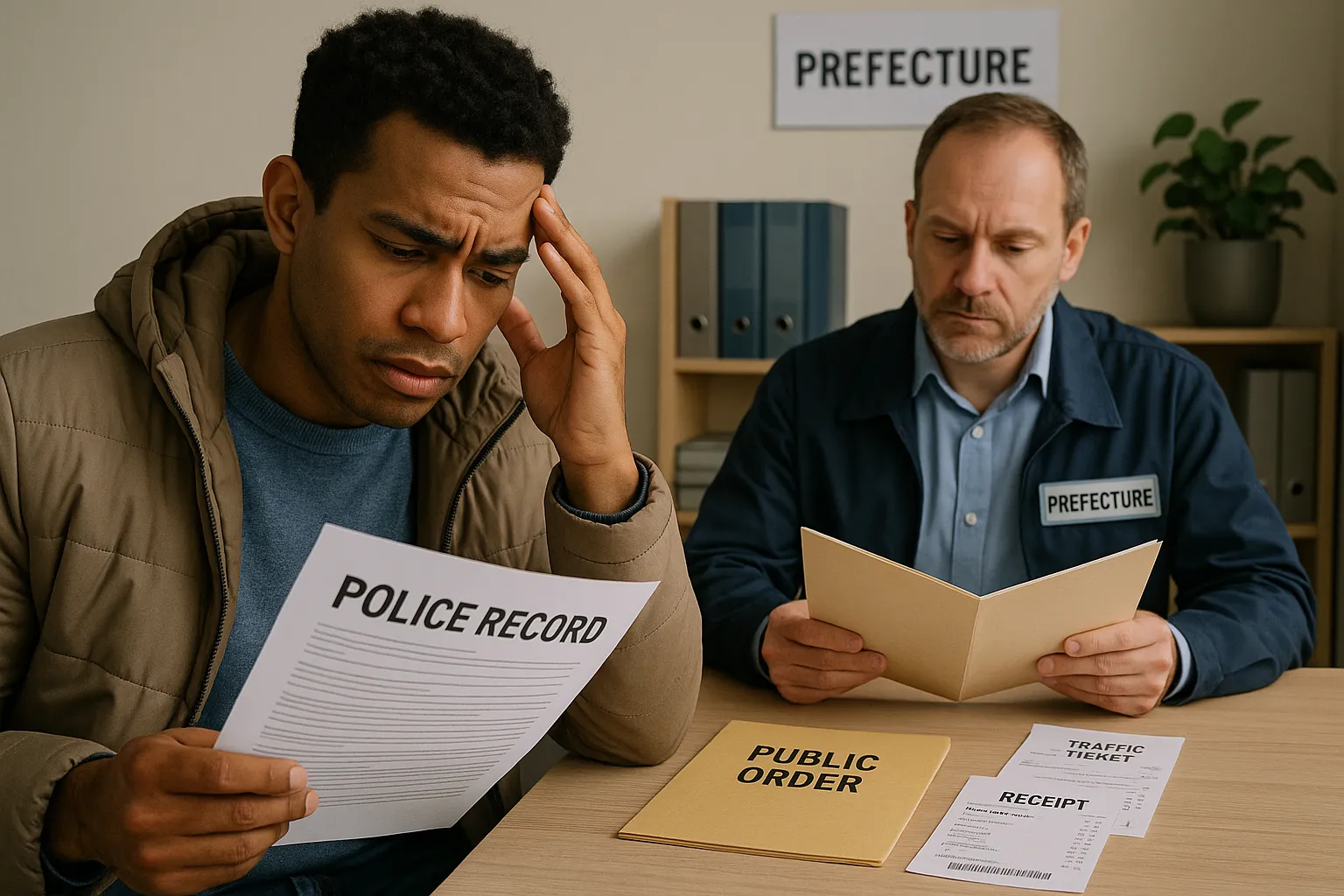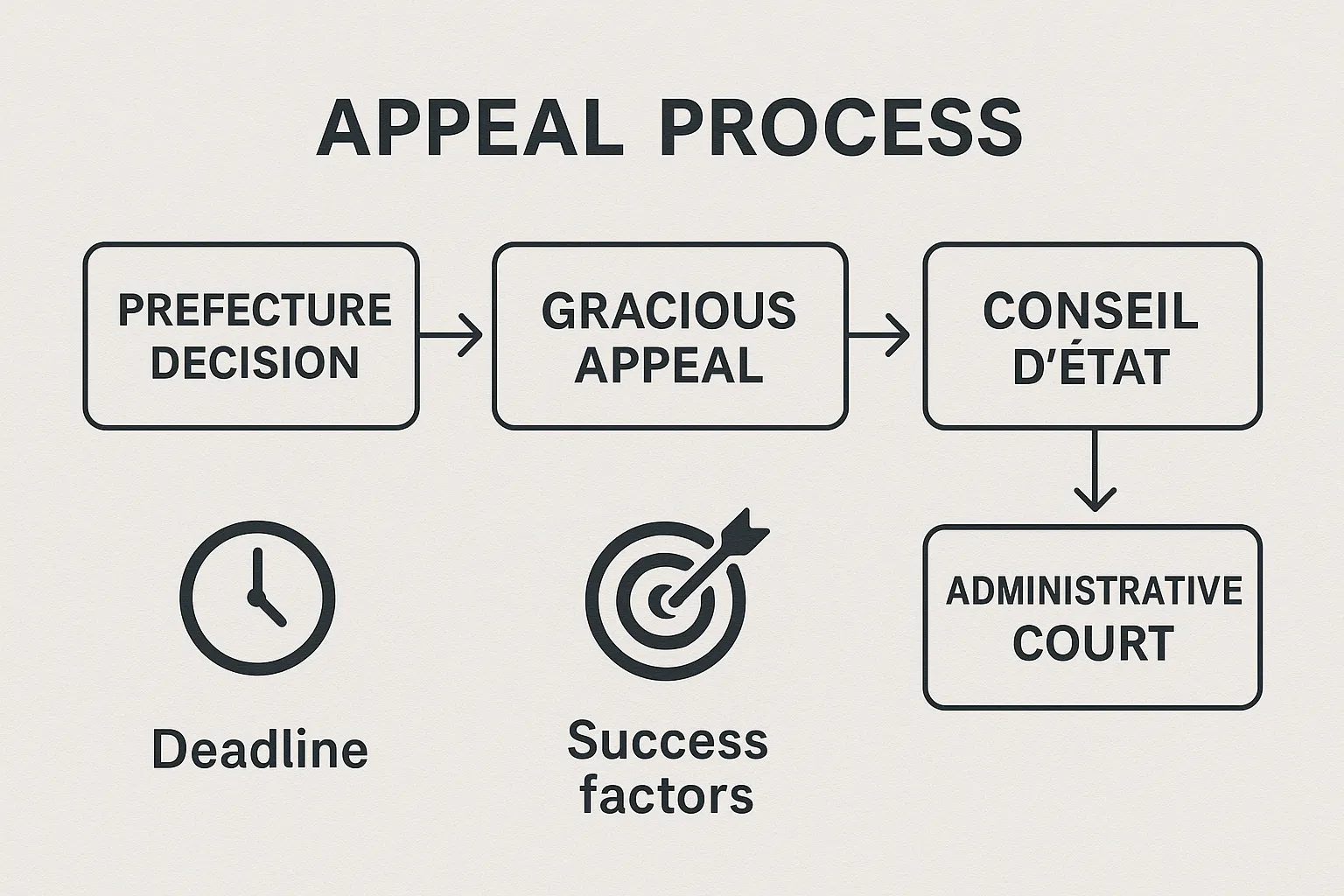Public Order Issues: How Minor Offenses Can Jeopardize Your Residence Card

Public order (ordre public) is one of the least-understood yet most decisive factors the prefecture examines when renewing or issuing a residence card. Many foreign residents discover, sometimes too late, that even minor brushes with the law can trigger a refusal, a shortened permit, or an Obligation to Leave French Territory (OQTF). In this guide we explain how public-order concerns are assessed, which “small” infractions create problems, and what you can do to protect your status in France.
1. Why the Prefecture Cares About Public Order
The legal basis is found in Articles L.312-3 and L.432-3 of the Code de l’entrée et du séjour des étrangers et du droit d’asile (CESEDA). These articles give prefects broad discretion to:
- Refuse to issue or renew a residence card when “the presence of the foreign national constitutes a serious threat to public order.”
- Withdraw an existing titre de séjour for the same reason.
Public order is interpreted widely. It covers serious crimes (terrorism, violent offenses) and also misdemeanors (contraventions and délits) that suggest disrespect for French law, even if no prison sentence is imposed.
2. Minor Offenses that Often Trigger Red Flags
2.1 Traffic-Related Infractions
- Driving without a licence or insurance
- Repeated excessive speeding (contrôle radar)
- Driving under the influence of alcohol (DUI) or drugs, even first offense
The Ministry of the Interior reported in its 2024 annual review that 27 % of residence-permit refusals for public-order reasons involved road-safety violations.
2.2 Shoplifting or Petty Theft
A single shoplifting conviction, classified as a délit, may lead the prefecture to question your “morale” and trigger a refusal.
2.3 Domestic Disturbance and Noise Complaints
Repeated contraventions for late-night noise or neighborhood disturbances are recorded in police databases and can appear during the prefecture’s background check (STIC and TAJ files).
2.4 Fraud-Related Offenses
Using someone else’s travel card, undeclared work under someone else’s name, or minor social-benefit fraud are seen as attacks on public finances and are taken seriously.
| Offense (example) | Legal classification | Typical penalty | Public-order impact |
|---|---|---|---|
| DUI first offense | Délit | Fine up to €4 500, licence suspension | High, systematic prefecture review |
| Shoplifting < €300 | Délit | Fine or suspended sentence | Medium, depends on recurrence |
| Noise at night (tapage nocturne) | Contravention 3rd class | €68 fine | Low but cumulative effect |
| Driving without insurance | Délit | Fine up to €3 750 | High, often cited in refusals |
3. How the Prefecture Assesses Risk
- Police files (TAJ, FPR, STIC): list arrests, complaints and convictions.
- Judicial record (Bulletin n°2): supplied by the prosecutor directly to the administration.
- Recurrence and recency: offenses in the last 3–5 years weigh heavily, but older convictions matter if they were repeated.
- Severity and context: violence, weapons, or endangerment of others escalate the threat level.
- Rehabilitation efforts: payment of fines, community service completion, training courses, or proof of therapy can mitigate risk.

4. Typical Administrative Consequences
- Refusal of renewal: Prefecture issues a refusal decision (refus de renouvellement) possibly accompanied by an OQTF giving you 30 days to leave France.
- Issuance of a temporary card: Instead of a multi-year carte de séjour, you may receive a six-month récépissé or a one-year card labelled “vie privée et familiale – autorisé à travailler,” giving the prefecture time to monitor your conduct.
- Shortened validity: A ten-year residence card can be downgraded to a one-year card at the next renewal.
According to the Défenseur des Droits 2023 report, about 8 900 OQTFs (13 % of the total) were delivered after a permit renewal refusal tied to public-order considerations.
5. What To Do If You Have a Recent Offense
- Consult your judgment (jugement) or ordonnance pénale: Verify the exact legal classification and penalty.
- Pay all fines immediately: Unpaid fines are interpreted as non-cooperation and aggravate your case.
- Collect evidence of integration:
- Permanent labor contract (CDI), pay slips
- Children enrolled in school
- Certificates of French courses attended (DELF, FLE)
- Volunteer or community involvement letters
- Request erasure from TAJ/STIC, if eligible: After a certain period (three to five years for many délits), you can petition the prosecutor to delete older records.
- Prepare a written explanation: Demonstrate remorse, provide context, and outline steps taken to avoid repetition.
6. Contesting a Refusal or Withdrawal
If you receive a refusal or an OQTF:
- Administrative appeal (recours gracieux): File within two months (or 30 days for OQTF) directly to the prefect.
- Litigation before the Administrative Court (recours contentieux): Must be filed within the same time limit. For an OQTF, the court decides within 6 weeks.
- Request suspension (référé-suspension) if urgent removal is scheduled.
Success rates improve significantly when arguments focus on proportionality: length of stay, family ties, employment, health, and genuine rehabilitation.

7. Practical Tips To Preserve Your Carte de Séjour
- Treat traffic violations seriously: contest unjust tickets, pay legitimate ones fast.
- Keep proof of address updated; missing a court summons because of a wrong address can lead to default convictions.
- Always disclose convictions honestly on renewal forms. Lying constitutes a separate offense of false declaration.
- Attend required educational programs (stage de sensibilisation à la sécurité routière) promptly.
- Maintain impeccable integration records: tax returns filed, no gaps in health-insurance contributions, children’s school certificates.
8. How ImmiFrance Can Help
Public-order refusals are among the most complex cases because the prefecture’s discretion is broad. Our network of immigration lawyers analyzes your criminal and administrative record, gathers mitigating evidence, drafts persuasive appeals, and represents you before the Tribunal Administratif. Thanks to real-time case tracking on your ImmiFrance dashboard, you know exactly when each brief is filed and when hearings are scheduled.
Internal resources you may find useful:
- Step-by-step guide: How to Contest an OQTF
- Checklist: Renewing Your Residence Permit Without Stress
Frequently Asked Questions
Can a single speeding ticket lead to a residence-permit refusal? Isolated contraventions rarely cause problems, but multiple speeding tickets within a short period or a serious excess over the limit (50 km/h+) can be treated as a threat to public order.
How long do minor offenses stay on my record? Contraventions are kept in police files for up to 5 years and délits for up to 20 years, but you may request early deletion once fines are paid and no recurrence occurs.
What if the charges were dismissed? If your case ended with a dismissal (classement sans suite) or acquittal, obtain the court decision and present it to the prefecture. You can also request the removal of related TAJ entries.
Can I travel abroad while my appeal is pending? Once your titre de séjour expires, re-entry can be refused. Ask the prefecture for a récépissé, or the court for an autorisation de retour, before leaving France.
Need Expert Help Today?
A minor misstep should not erase years of hard work building a life in France. Book a confidential consultation with an ImmiFrance specialist and safeguard your right to stay. Our bilingual team is ready to review your file and build the strongest possible defense.
Secure your future in France—schedule your appointment now on https://immifrance.com. We stand with you every step of the way.
